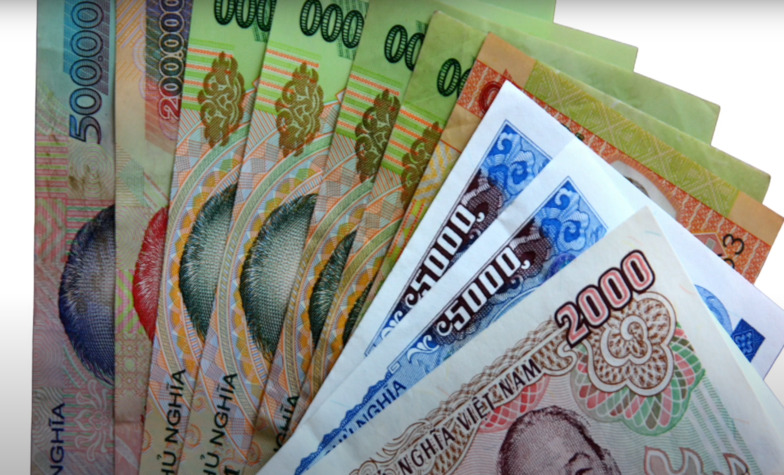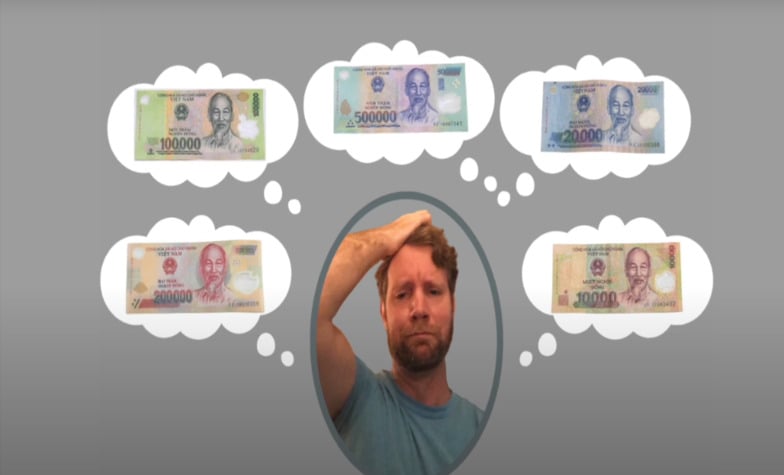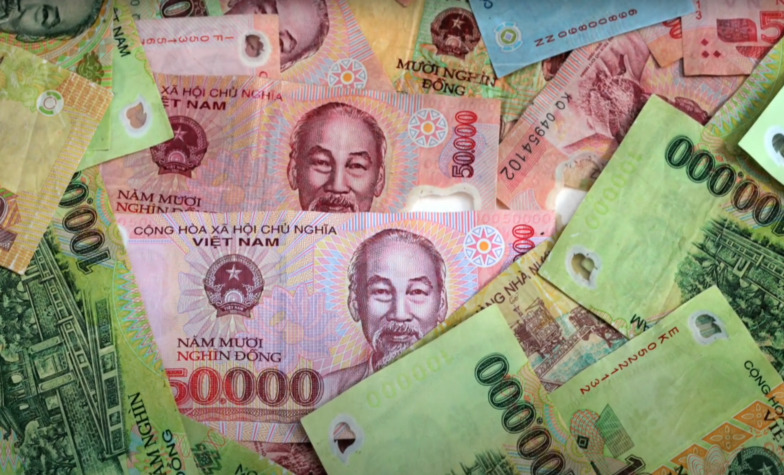The local currency of Vietnam is the dong, which refers to ‘d’ or ‘vnd’. Among them, small denominations include paper notes of VND 1000; 2000; 5000, while bigger ones include polymer notes of VND 10,000; 20,000; 50,000; 100,000; 200,000; 500,000 with Ho Chi Minh’s picture is on every banknote. The interesting thing when you are in Vietnam and change your money is that you suddenly find yourself VND millionaire.
Read more:
Currency use
Vietnam dong is the first and theoretically the only official currency for any common transaction in the country. According to government regulation, all prices for services and commodities must be quoted in VND; foreign currencies can be only dealt with through authorized exchange bureaus or with special permission.
In fact, USD is considered the second currency in tourist places, and with the commonness of EUR, AUD, BP… goes on respectively. Places like restaurants, bars, travel agencies, or souvenir shops in tourist places sometimes accept both USD and VND and prices might be quoted in both types of currency so, the best solution is to carry both of them. Out of tourist sites or in remote areas, only Vietnam dong is accepted.

Remember to stock up enough small bills for your petty deals when you around. Additionally, it is better to check all bills to make sure they do not have any tears in the corners or look too tatty, as local restaurants and shops will not accept them. Also, try to change just enough money at one time following your plan to avoid a large wad of notes. At the present, the largest denomination is currently 500,000 dong. The notes of 20,000 dong look quite similar but the value is really a big gap. Keep big notes separate from other smaller notes to avoid confusion then.
Exchange money
The exchange rate is rather fluctuant due to inflation or other effects including government regulation that was issued methodically at the time. Recently, the exchange rate for 1 USD is around 24.000 to 25.500 VND.
Exchanging money in Vietnam is quite convenient, with many reliable locations available. Major banks like Vietcombank, BIDV, and Techcombank offer currency exchange services with competitive and secure rates. You just need to bring your passport to any branch of these banks. Additionally, international airports such as Noi Bai (Hanoi) or Tan Son Nhat (Ho Chi Minh City) have exchange counters. Although the rates at airports may not be as favorable as at banks, they remain a convenient option when you first arrive in Vietnam.
Besides reputable locations, some travelers opt to exchange money at gold shops or on the black market to get better rates. However, these places carry many risks, such as receiving counterfeit money, being scammed, or facing fines for exchanging at unauthorized locations. Vietnam’s laws strictly regulate currency exchange, allowing only licensed establishments to operate legally. Therefore, even if the rates are attractive, exchanging money in these places is not a safe option.
ATMs and Credit cards
In cities and tourist places, you can easily find ATMs from different banks at many corners of the streets. The most common and well-represented banks include Vietcombank, Argribank, Vietinbank, Sacombank, SEAbank, and so on. HSBC, ANZ, Citibank, or some other foreign banks are less common but can be found in big cities. Withdrawals are issued in dong, and most Vietnam banks offer multiple withdrawals with a limit of 2,000,000d each time. ANZ offers a far higher limit depends on your type of card.
The ATM fees are 20,000 or 40,000 per transaction depending on what bank you use. You can use your credit card (Visa, Master Card, Plus, Cirrus, JCB, etc.) to withdraw cash from ATM anytime in a day. However, remember that a 3% service fee is normally charged per transaction. Amex is accepted somewhere but the fee is a little bit higher (around 4%).

You cheques have now become less common since using ATMs is much more convenient. You need to present your passport and pay the transaction fee of around 2-5% per transaction to get cash at authorized foreign exchange outlets and banks. When traveling abroad, besides travelers' cheques, you should also bring along some US dollars in hand. If your cheques are in different currencies (not US dollars), they may be rejected in some cities.
Costs
The cost of traveling in Vietnam ranges from dirt cheap to sky-high. You can live it up with a budget from US$15 to US$250 depending on your level of taste and comfort. In comparison to many parts of the world, travel in Vietnam, in general, is quite cheap and reasonable.
Street food is cheap and you can fill your stomach with around US$2 or US$3. A meal in an average restaurant costs you around US$5 to US$8 while gourmet restaurants can offer a good meal with a dink between US$12 and US$15. Drinks in the bar are quite reasonable with US$1 or US$2 for a beer, cocktail from US$3 to US$6.
If you plan to do good shopping on your Vietnam holiday, then it is the right place. With cheap labor cost, most of the product made in Vietnam is in good price. Here you can find stuffs from clothes, bronze wares, china wares, wood carvings, paintings and so on with good quality and reasonable price.
Tipping
Tipping is not compulsory in Vietnam, but it is extremely highly appreciated. If you're happy with the services provided, then some tip is appropriate. It shows your great significance and satisfaction to the people who take care of you during the trip, encourages excellent services, and is a deep-rooted factor of the tourism industry.
Although in some hotels or restaurants, a service charge of 5% is sometimes put on your bill but this money most likely not going to the pocket of workers. So, if you are happy with the service provided, tipping should be given directly to the recipient.
The following amounts are recommended per person based on local considerations and collections of feedback from our past travelers:
-
In local restaurants, if you are a single diner, then a tip of around US$1 is appropriated. It is from 10% to 15% of your bill in the more up-market restaurants. If you are in a group then depends on the group size, a gather of US$4 or 5 is good.
-
For drivers, we suggest US$5 if you are a single traveler and an amount of US$10-15 from the whole group per day can be used. For your tour guides or group leaders, tipping is much depending on their services. The amount is entirely a personal preference; however, it is US$5-7 per day or US$2-4 per person in a group tour is appropriate.
-
Of course, tipping is not mandatory at all. Your tip can be more or less depending on your satisfaction regarding the services’ quality and the duration of the trip.
A guide to spotting counterfeit Vietnamese Dong
It's essential to be able to spot counterfeit Vietnamese Dong to protect yourself from financial fraud. Here are a few simple tips to help you:
-
Feel the material: Genuine polymer banknotes have a distinct smooth texture and are resistant to tearing. Counterfeit notes, however, are often made from inferior materials and are easily damaged.
-
Look for the color-shift: Genuine banknotes of 50,000 VND and above have a special color-shifting ink in the lower left corner. When tilted, the number changes from green to blue. Counterfeit notes usually don't have this feature, or the color change is unclear.

-
Examine under a light source: Look for the watermark, which is the hidden image of President Ho Chi Minh or the denomination. It should be clear and well-defined on genuine banknotes. Counterfeit notes often have a blurry or missing watermark.
-
Run your fingers over the note: Genuine banknotes have raised printing, such as the words "Ngân hàng Nhà nước Việt Nam". Feel for these raised areas. Counterfeit notes often lack this raised print and feel smoother.
-
Examine the serial number: Authentic banknotes have a clear and consistent serial number. Counterfeit notes often have a blurry or misaligned serial number, or the color may be inconsistent.
Our tours you may like:
***
Travel Authentic Asia Company is your best choice for discovering the beauty of Southeast Asia. Our experienced and knowledgeable travel advisors are committed to helping you create a tailor-made tour and extraordinary experiences in this majestic region.
If you're looking for an authentic cultural experience, do not hesitate to contact Travel Authentic Asia to choose a Vietnam tour, Southeast Asia tour package or to customize your own style tour to South East Asia.

